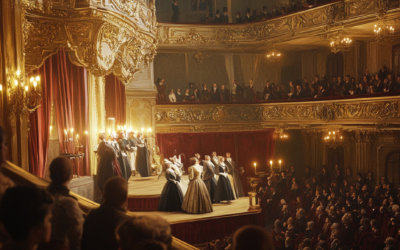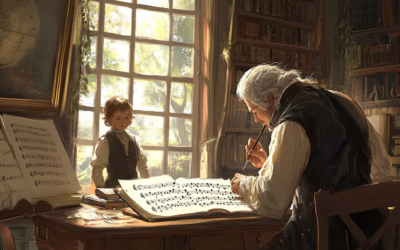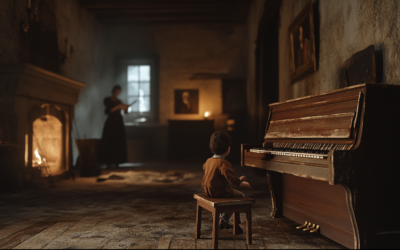Mozart’s Training
The Myth of Genius Shattered
The myth of Mozart’s genius is nothing more than a carefully crafted illusion, propped up by misplaced attributions and romanticised biographies. Behind his so-called brilliance lies the reality of his father’s dominating influence and a lack of formal education.
Mozart: The Fall of the Gods
This book offers a fresh and critical look at the life of Wolfgang Amadeus Mozart, challenging the myths that have surrounded him for centuries. We strip away the romanticised image of the “natural genius” and delve into the contradictions within Mozart’s extensive biographies. Backed by nearly 2,000 meticulously sourced citations, this work invites readers to explore a deeper, more complex understanding of Mozart. Perfect for those who wish to question the traditional narrative, this biography is a must-read for serious music lovers and historians.
"Mozart’s so-called maturation as a composer was more a product of Leopold’s craft than any external influence."
Mozart: The Fall of the Gods
When it comes to Wolfgang Amadeus Mozart, the myth of innate genius has been perpetuated for centuries. But if we strip away the romanticism and look at the facts, a different picture begins to emerge. Far from being a natural-born prodigy, Mozart’s musical abilities were meticulously shaped under the strict and controlling hand of his father, Leopold, and not by some divine inspiration or natural talent.
Mozart’s education was far from conventional. Unlike his father, who received a formal education at the hands of Jesuits, Amadé never attended school. He didn’t have systematic lessons in harmony, counterpoint, or fugue, nor did he benefit from the intellectual and musical training that other musicians of his time received in colleges or religious institutions. His schooling was entirely confined to his father’s relentless tutelage. Yet, for years, biographers have attempted to place Wolfgang under the tutelage of prestigious teachers like Padre Giovanni Battista Martini, despite the glaring lack of evidence.
Martini was a celebrated teacher, whose influence has been exaggerated in Mozart’s case. Theories linking Martini’s teaching to Mozart’s compositions have persisted for years. Musicologists have even gone so far as to analyse Wolfgang’s works before and after his visit to Bologna in 1770 to ‘prove’ the supposed influence of the famed didact. Yet, closer examination reveals these claims to be weak at best. It wasn’t Martini’s guidance that shaped Mozart’s sacred music, but rather the hand of his father.
Mozart’s masses, such as the K.115 and K.116, once hailed as evidence of his development under Martini, have since been attributed to Leopold, not Wolfgang. The more closely we examine the so-called “masterpieces” of Mozart, the more the cracks begin to show. The most embarrassing realisation, however, is that for all of Wolfgang’s supposed “originality,” his most lauded works in sacred music were little more than compositions reworked from his father’s drafts.
In fact, in 1953, Karl Pfannhauser discovered that the Kyrie K.221, Lacrimosa K.Anh.21, and another untitled fragment came from Johann Ernst Eberlin’s Requiem in C Major, a piece once very popular in Austria and certainly admired by the Mozarts. For many years, it was believed that Wolfgang had copied Eberlin’s Lacrimosa, omitting the nine-bar orchestral introduction. However, in 1961, Wolfgang Plath confirmed that all three pieces had actually been copied by Leopold, not Wolfgang. The 1964 Köchel catalogue still included these works under Mozart’s name, but classified them as music that Wolfgang had copied from other composers. Further evidence found after World War II confirmed beyond doubt that the Kyrie K.221 was indeed copied by Leopold.
In reality, the notion that Mozart’s church music owed anything significant to Martini is a fabrication. Wolfgang’s so-called maturation as a composer was more a product of Leopold’s craft than any external influence. This becomes particularly evident in the way Mozart mirrored the style of his father’s compositions and even used entire sections of his father’s work in his own pieces, like the K.115. The narrative that Mozart became “autonomous” through Martini’s teaching is, in fact, a convenient fantasy.
You May Also Like
The Vienna Disaster
The failure of La Finta Semplice in Vienna was a turning point for the Mozart family, revealing the cracks in the facade of Wolfgang’s prodigious reputation and prompting a desperate escape to Italy in search of redemption.
From Innsbruck to Bolzano
From Innsbruck to Bolzano, the Mozart family’s journey was a blend of strategic networking and missed opportunities, revealing the challenges of securing fame in 18th-century Europe.
The Myth of Mozart’s Sight-Reading Genius
Mozart’s so-called sight-reading miracles were less about supernatural talent and more about clever improvisation, as two key 18th-century witnesses make clear.
The Hidden Legacy of Michael Haydn
Mozart’s Symphony No. 37, K.444, is more Haydn than Mozart. How did this happen? A story of deception and misattribution unfolds.
The Myth of Mozart’s Education
For centuries, Wolfgang Amadeus Mozart has been celebrated as a musical prodigy, effortlessly composing masterpieces from a young age. However, when we peel back the layers of myth surrounding his early education, a different picture emerges—one in which his father, Leopold Mozart, plays a far more controlling and influential role than is often acknowledged. This article explores the true nature of Mozart’s education, examining how much of his early works can be attributed to his own genius, and how much was the product of his father’s meticulous and often self-serving guidance. Was Wolfgang’s brilliance entirely his own, or was it a crafted image designed by Leopold?
The Myth of Mozart’s Childhood
Mozart’s childhood is often romanticised, but behind the myth lies a more complex reality. This post explores the hidden dynamics within his family, questioning the traditional narrative of Mozart's early years and shedding light on the forgotten role of his sister,...







